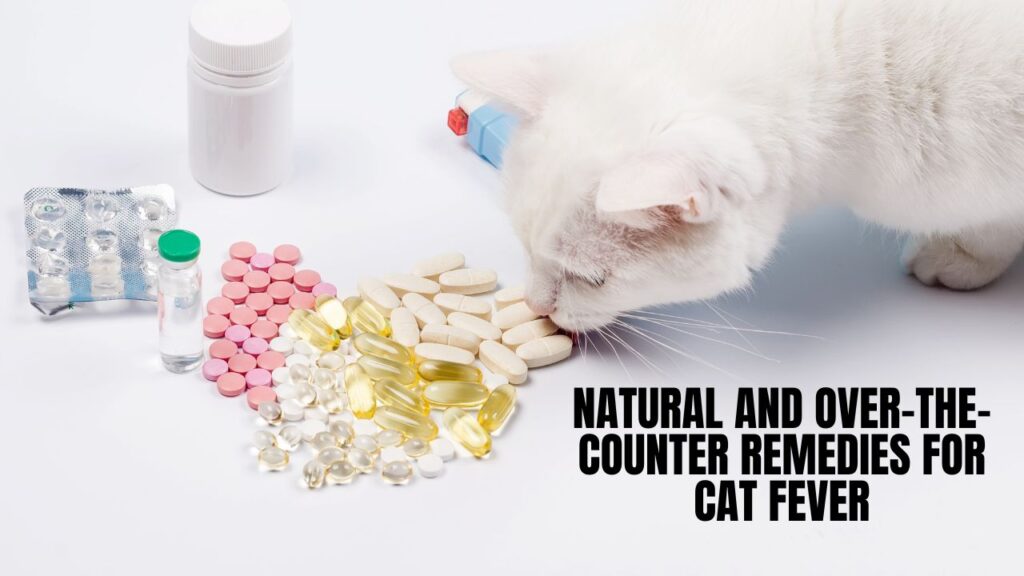Have you ever walked into a room to find your cat curled up in a ball, looking a little sluggish or out of sorts? Then you notice something concerning—your cat feels unusually warm, and their usual energy is nowhere to be found. Your cat might have a fever. But what can you do about it? How can you help them feel better?
In this article, we’re going to dive deep into cat fever medicine—everything from recognizing the signs of a fever in your cat to knowing when and how to treat it. We’ll walk you through the different causes of feline fever, the treatments available, and what you can do at home to help your furry friend feel comfortable again.
Understanding Fever in Cats: What You Need to Know
Before we get into the treatment options, let’s first take a moment to understand fever in cats. It’s not just about feeling warm to the touch—it’s a vital sign that something is going on inside their body.
A fever is defined as an elevation in body temperature above the normal range. In cats, the normal body temperature is between 101°F and 102.5°F (about 38.3°C to 39.2°C). A fever in cats is generally considered to be a body temperature above 103°F (39.4°C), though it can be higher depending on the underlying cause.
Signs Your Cat May Have a Fever:
- Increased body temperature: The most obvious indicator, but it’s hard to measure without a thermometer.
- Lethargy or reduced activity: Cats with a fever often become lethargic and may not engage in their usual playful or curious behavior.
- Loss of appetite: Feverish cats often eat less or stop eating altogether.
- Shivering or panting: Cats may exhibit signs of discomfort like shaking or panting as their bodies try to regulate their temperature.
- Warm ears or nose: A feverish cat may have noticeably warmer ears or nose than usual.
Causes of Fever in Cats: What Could Be Behind It?
A fever in cats can be a symptom of a wide range of underlying issues, from infections to inflammatory conditions. Knowing the cause of the fever is crucial for deciding the appropriate treatment. Here are some common causes:
- Infections:
- Bacterial infections (e.g., abscesses, pneumonia, urinary tract infections)
- Viral infections (e.g., feline leukemia virus, feline immunodeficiency virus, calicivirus)
- Fungal infections (e.g., histoplasmosis, blastomycosis)
- Inflammatory Diseases:
- Systemic inflammatory response syndrome (SIRS) or sepsis due to infection
- Arthritis or autoimmune diseases, which can lead to a fever as the body fights inflammation
- Cancer:
- Certain types of cancer, such as lymphoma, can cause a fever as the body reacts to the disease.
- Toxins:
- Cats who have ingested toxic substances (e.g., antifreeze, plants) may develop a fever.
- Post-surgical fever:
- Cats recovering from surgery may develop a mild fever as their body heals.
- Dental problems:
- Abscessed teeth or gum infections can also lead to fever in cats.

When to Call the Vet: Is Your Cat’s Fever an Emergency?
As a cat owner, it’s important to know when to seek professional help. While a mild fever might resolve on its own, more serious cases require immediate veterinary care.
When to contact your vet:
- If your cat’s temperature is above 104°F (40°C).
- If the fever lasts more than a day or two.
- If your cat shows signs of distress (e.g., vomiting, difficulty breathing, disorientation).
- If there are other symptoms like diarrhea, skin lesions, or coughing.
- If your cat is very young, old, or has a compromised immune system (e.g., due to illness or medication).
Important Tip: If you’re unsure of whether your cat needs to be seen by a vet, it’s always better to err on the side of caution. A quick check-up can help catch any serious issues early.
How to Treat a Fever in Cats: Cat Fever Medicine Options
Once you’ve determined that your cat has a fever and you’ve assessed the severity, it’s time to consider treatment. The exact medicine or approach will depend on the underlying cause of the fever. Let’s explore some of the most common methods of treatment:
1. Veterinary-Administered Medication
The treatment for your cat’s fever will primarily depend on the cause, so your veterinarian may prescribe the following medications:
- Antibiotics: If a bacterial infection is the culprit, antibiotics like amoxicillin or clavamox may be prescribed to treat the infection.
- Antivirals: For viral infections, specific antiviral medications, such as interferons, may be used, though these are less common.
- Antifungal medications: If a fungal infection is diagnosed, antifungal treatments like itraconazole may be necessary.
- Steroids or anti-inflammatory medications: In cases of autoimmune diseases or inflammation, corticosteroids (such as prednisone) may be prescribed to reduce inflammation and suppress the immune system’s overreaction.
2. Pain Management
If your cat is experiencing pain due to fever, the vet might prescribe pain relief (analgesics). It’s important not to give your cat over-the-counter human pain medications like acetaminophen or ibuprofen, as these are toxic to cats.
3. Fluids and Supportive Care
Dehydration is a common issue for feverish cats, so ensuring your cat has access to plenty of fresh water is crucial. In some cases, intravenous fluids or subcutaneous fluids might be needed to help rehydrate your cat.
4. Home Care and Comfort Measures
While medication is often necessary, there are also things you can do at home to help your cat feel better while they recover from a fever:
- Monitor temperature: A thermometer can help you keep track of your cat’s fever. You can measure a cat’s temperature using a digital thermometer inserted gently into the rectum.
- Keep them comfortable: Provide a quiet, warm space for your cat to rest in. Make sure they have a soft bed and access to fresh water.
- Encourage eating: If your cat is not eating, try offering them more appetizing food, like wet food or even baby food. Appetite stimulants may also be prescribed by your vet.
Important Note: Never attempt to reduce your cat’s fever with home remedies like ice packs or cold baths—these can cause your cat’s body temperature to drop too quickly and cause additional harm.
Common Cat Fever Medications and Their Uses
| Medication | Purpose | Common Use Cases |
|---|---|---|
| Amoxicillin | Antibiotic that treats bacterial infections | Abscesses, urinary tract infections, pneumonia |
| Clavamox | Antibiotic that targets a wide range of bacteria | Respiratory infections, dental abscesses |
| Prednisone | Corticosteroid that reduces inflammation | Autoimmune diseases, allergies |
| Itraconazole | Antifungal medication | Fungal infections like histoplasmosis |
| Rimadyl | Non-steroidal anti-inflammatory drug (NSAID) | Pain relief for inflammation or arthritis |
| Subcutaneous fluids | Hydration therapy | Dehydration due to fever or illness |

Natural and Over-the-Counter Remedies for Cat Fever
While prescription medications are often necessary, some pet owners turn to natural remedies to support their cat’s health during a fever. However, always consult your vet before using any home remedies.
- Herbal remedies like catnip can help calm your cat down and reduce stress, which may help them feel better.
- Fish oil or Omega-3 supplements can help boost your cat’s immune system.
- Hydration is key: You can offer your cat electrolyte drinks formulated for pets, or wet food to help with hydration.
FAQs About Cat Fever Medicine
1. Can I give my cat Tylenol or aspirin to reduce their fever? No! Never give your cat human medications like Tylenol (acetaminophen) or aspirin. These can be toxic to cats, causing severe liver damage, kidney failure, or even death. Always use vet-approved medications.
2. How can I tell if my cat’s fever is caused by an infection or something else? A fever can be caused by a wide range of conditions. Only a veterinarian can accurately diagnose the cause through exams, tests, or blood work. If your cat’s fever lasts longer than a day or is accompanied by other symptoms like coughing or vomiting, it’s time to see a vet.
3. How long will it take for my cat to recover from a fever? The recovery time depends on the underlying cause of the fever. A simple fever caused by mild illness might resolve in a day or two, while more serious conditions might take longer. Your vet can give you a better idea based on the diagnosis.
Conclusion: Keeping Your Cat Safe and Healthy
Fever in cats can be caused by a variety of issues, ranging from simple infections to more serious conditions. While cat fever medicine can help treat the underlying causes, it’s crucial to know when to intervene and seek professional veterinary care. By understanding the causes, treatments, and signs of fever, you can ensure your cat gets the right care at the right time.
Always consult your vet if you’re unsure about your cat’s symptoms, and remember—early treatment can make all the difference in their recovery. Your cat’s health and comfort are worth every effort, and with the right care, your feline friend will be back to their playful, purring self in no time!

